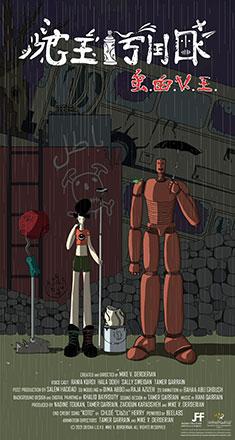You are here
Jordanian-Palestinian director’s short film brings focus to ‘honour killings’
By Hanna Davis - Sep 24,2021 - Last updated at Sep 24,2021
AMMAN — In the back of a pick-up, the girls do not speak. This is the last time Diana will ride next to her sisters, through the fertile fields of the Jordan Valley and the molokhia plants ready for harvest.
This is Diana’s last day.
These are scenes from Maysoon Khaled’s short film, “Diana”, in which a young woman recounts the last three days of her life before her death in a so-called honour killing. The film was shown for the first time in Jordan at the closing ceremony of the Amman International Film Festival (AIFF).
Khaled, a Jordanian-Palestinian film director, said she based the film off of an “honour killing” in her community in Jordan.
“The story happened in an area very close to me. But, it was very hard to find information about this story,” Khaled said in a recent interview with The Jordan Times.
“I felt that it is kind of harsh that a human life is just gone,” Khaled said, “but people, they don’t want to talk about it, or at least reflect a little bit about it.”
An “honour killing” incident occurs when a family feels that their female relative has tarnished their reputation by what they loosely term “immoral behaviour”, according to Jordanian journalist Rana Husseini’s book “Murder in the Name of Honour”.
Husseini, a journalist at The Jordan Times, has spent her career covering the atrocities of “honour killings” and has brought the crimes to global attention.
In Jordan, there are 12 to 15 “honour killings” incidents reported annually, Husseini told The Jordan Times. Globally, there are 5,000 women murdered each year in the name of honour, she added.
Many people mistakenly associate “honour crimes” with Islamic communities. However, these killings take place in many different cultures and societies, according to Husseini.
“Connecting any kind of violence against women to a certain country, religion, or class is unfair and unrealistic,” Husseini said.
Khaled said that she received Husseini’s guidance on how to portray this sensitive topic in a way that would not reinforce misconceptions.
She expressed her inspiration from the discussion the film has already facilitated. She hopes to bring this discussion further, into Jordanian communities.
Khaled is currently looking for NGO partnerships and agreements with the government to help bring the film to schools and communities in Jordan. She hopes the film can encourage discussions about “honour crimes”, particularly among youth.
“At a young age, it is good to have this critical thinking,” she added.
Khaled thanked the Royal Film Commission for their support and specifically the help of the “Impact Distribution Workshop”, part of the AIFF.
“We may have a traumatic story, but we want the impact to be positive,” Khaled said.
Related Articles
AMMAN — The glowing Amman skyline provided a fitting backdrop for the closing ceremony of the Amman International Film Festival (AIFF)
AMMAN — Police on Saturday said a popular social media activist was arrested over the weekend while returning to Jordan via the Queen Alia I
AMMAN — Tickets were released on Thursday for the Amman International Film Festival - Awal Film (AIFF), which will take place between August


















